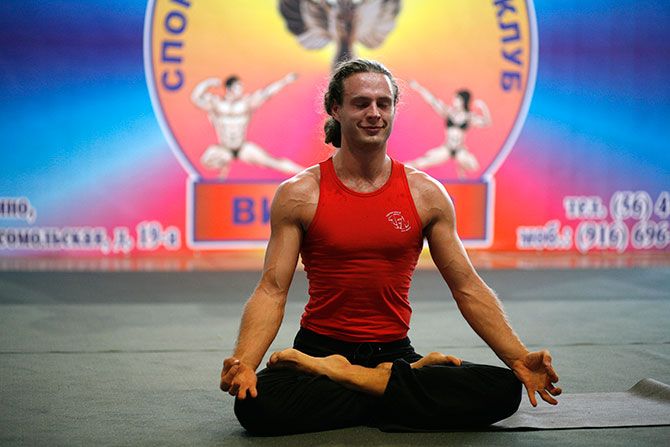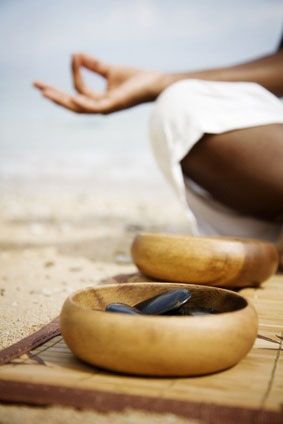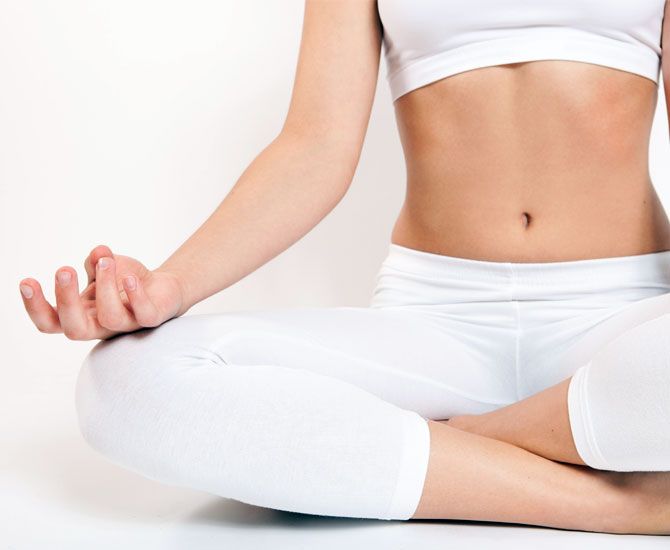Five sure-fire healing practices from yoga that will rid you of the curse of depression by Shameem Akthar, yogacharya trained with Sivananda Yoga.
Any form of yoga, including its simplest poses and practices, hit upon acupressure points that deal with psychosomatic "joy" centres.
So, when you start on a yoga practice, even if you do not believe in its near-miraculous impact, you will find that there is relief, almost immediately.
This accounts for the craze yoga draws across the globe.
The face (in depression skin can be affected) clears up, the posture assumes confidence, breath is relaxed and the expression shifts to become more open, less anxious.
All of these will be noticed by those around the depressive and often commented upon, that is how obvious the impact if, of yoga, in acute cases of depression.
Other health issues that arise inevitably with depression -- insomnia, weakened or fragile immunity, turbulent digestive system, messed up blood sugar or blood pressure, topsy-turvy hormonal flow (thyroid, reproductive systems immediately suffer from acute depression) -- all get resolved alongside.
Emotional mess-ups that occur along with depression -- such as low self-esteem, hyper-anxiety, or its counterpart which is dullness and lethargy -- also get slowly ironed out of the system.
1. Matysasana (Fish pose)

Lie on your back, palms flat under your back, so sides of either thumb are touching. Legs are stretched out and together.
Inhale, lift your head off the ground, to look at the toes.
Shift the effort to your elbows at this point.
Exhale, drop the head back, arching neck to place crown (if flexible) or back of head on the ground.
Mouth should remain shut, chest should be pushed out.
Continue normal breathing.
Hold for 15 seconds.
Wind off, by exiting the way you entered, to lift you head up, look at toes, then slide back gently on the ground.
With regular practice, time in the final pose, may be increased to one minute or more.
Benefits: Pushes into "bliss spots" at the arm pits and collar bones.
Releases hidden sorrows (and often, those with deep hurt from the past will cry as it sadness gets physically dislodged).
Boosts immunity, which is usually compromised by depression, and improves breathing which is shallow in depressives.
The 'energy' gland thyroid is massaged, providing a natural lift.
Image: Matsyasana
Photograph: Maxim Kuschpel/Creative Commons
2. Kapalabhati (Skull-cleansing pranayama)

Sit in any cross-legged or meditative posture.
Hold either hand in any mudra listed below. Shut your eyes.
Inhale and exhale a few times.
Then, inhale lightly and exhale forcefully, doing this in a continuous manner.
Try not to exert at the face or frown, because it will create permanent furrows in the face.
Practice fast inhalation-exhalation 30 to 60 times. Relax. This is one round.
Repeat two more times
Note: Initially you may feel dizzy, especially if you are under medication or suffer from the habit of shallow breathing (which happens if you are depressed).
If that is the case, acclimatise yourself slowly, by doing ten times, then progressively increasing it over several weeks to desired number so the body gets used to it.
Avoid it in extreme high blood pressure or cardiac conditions.
Benefits: Improves breathing.
Facilitates hyperventilation of the mind, removing negative thought patterns.
Stimulates and excites the mind, removing lethargy.
Improves immunity, lung function, and skin tone.
Image: Kapalbhati
Photograph: Oleg Klementiev/Creative Commons
3. Bhastrika (Bellows breathing)
The practice is somewhat similar to Kapalbhati except Bhastrika is very forceful and the effort has to be shifted to the entire body and the exhalation should be more thorough and forceful.
However, with this pranayama, you only need to do 10 such hyper-ventilations in each round.
Do not overdo, or you may exhaust your system.
Note: Avoid if you suffer from high blood pressure, cardiac conditions, or inflammatory conditions, or are running fever.
Benefits: Same as kapalbhati, more enhanced.
4. Vayu vardhak mudra

Touch the tip of the index finger to tip of thumb.
Hold for long, in serious clinical depression conditions.
Benefits: Helps to treat depression. Increases interest and liveliness back in life. Stimulates the mind.
Image: Vayu vardhak mudra
Photograph: Patrizia Soliani/Creative Commons
5. Surya mudra

Press down the ring finger with the thumb.
Hold for long, during meditation, pranayama, or when just passive (like watching TV).
Repeat several times a day.
Note: Since Surya mudra increases heat, you need to hydrate. Avoid if you suffer from high blood pressure.
Image: Surya mudra
Photograph: Relaxing Music/Creative Commons










